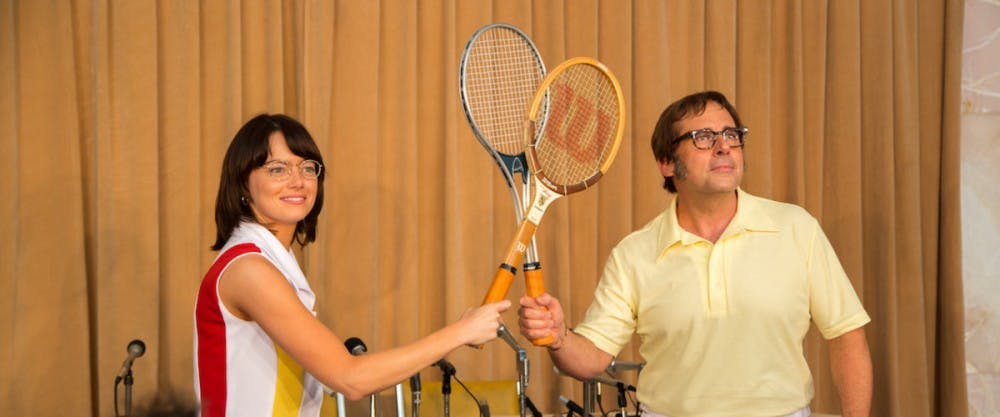In ‘Battle of the Sexes’ the stakes extend beyond the sporting arena

Forty-four years ago, 90 million people sat in front of their televisions and over 30,000 filled the seats of the Houston Astrodome to watch a tennis match that was far from ordinary. This coed match between Billie Jean King and Bobby Riggs had one of the largest audiences for a tennis match in United States history and the power to equalize American professional sports on the gender front. From the husband-and-wife directing team of “Little Miss Sunshine” comes a behind-the-scenes drama about that iconic “battle of the sexes,” and the chain of events that led to it.
By 1973, tennis player Billie Jean King (Emma Stone) has become the most successful female athlete of all time, with a reputation for championing women’s rights. Upon discovering that she’s being paid less than the preeminent male tennis players, King teams up with magazine publisher Gladys Heldman (Sarah Silverman) and eight other female tennis players to launch their own tennis circuit in protest. As the new organization gains support in fans, finances and participants, one of the men who takes notice is retired tennis player Bobby Riggs (Steve Carell). A gambling addict eager to get back in the spotlight, Riggs bets that he could take on any female tennis player and win. After he defeats the women’s No. 1 player, Margaret Court (Jessica McNamee), thus threatening to undermine public perceptions of women’s sports, King agrees to face Riggs in a history-making match that will be her ultimate statement on gender equality.
Emma Stone’s fiery performance as Billie Jean King, her first post-Oscar role, is inspiring and unapologetic, like the real woman. Fearless but without arrogance, assertive but not cruel, King doesn’t see herself as better than those around her. In her mind, even her detractors are her equals. She realizes that she must make her own opportunities if she wants to change things, and she’s always aware that her actions affect everyone, not just women. She embodies the expression that, if you can’t go through the mountain, you can find a way around it. And Emma Stone’s fiery performance as Billie Jean King, in her first post-Oscar role, is inspiring and unapologetic, like the real woman. By highlighting his showmanship skill, Steve Carell humanizes Riggs, who espouses chauvinist philosophies that the hustler may or may not fully believe. Yet, underneath all of the banter, the two still respect each other, which pays wonderful homage to the real-life friendship between King and the late Riggs. Austin Stowell’s small role as King’s husband Larry leaves an astounding impression on the viewer because of his unwavering support for Billie Jean’s choices. Margaret Court’s husband, Barry, played by James Mackay, serves as another example of this then-unconventional attitude for a man to have.
For Billie Jean King, the tennis court wasn’t a game of winners and losers. It was the great equalizer — a stage from which to implement social change. If there’s one thing that people from different walks of life have learned from her, it’s that, in the game of life, we’re all in this together.
More from The Rice Thresher

Study Abroad Photo Contest spotlights global experiences
For the first time since the Covid-19 pandemic, students gathered in the Ley Student Center to celebrate global experiences through photography.

Review: "The Crux" Should Redefine Djo
Joe Keery’s work has been boiled down to Steve Harrington from “Stranger Things,” but this label shouldn’t define his 10 years in the entertainment industry. Keery, under his stage name “Djo", is the voice behind the TikTok hit “End of Beginning,” which was released with his album “DECIDE” in 2022 and climbed the charts for the first time in 2024. With “The Crux”, Keery’s third album, he tries to separate his work as Djo and an actor, evidenced by the album’s visual of Keery escaping a building.

Review: “Lonely People With Power” merges blackgaze fury with dreamy introspection
Fifteen years into a storied career that’s crisscrossed the boundaries of black metal and shoegaze, Deafheaven has found a way to once again outdo themselves. “Lonely People With Power” feels like a triumphant return to the band’s blackgaze roots, fusing massive walls of guitar-driven sound with whispery dream-pop interludes, recalling their classic album trio of the 2010s (“Sunbather,” “New Bermuda” and “Ordinary Corrupt Human Love”). It also bears the learned refinements of “Infinite Granite,” the 2021 album where they dabbled more boldly in cleaner vocals and atmospheric passages.

Please note All comments are eligible for publication by The Rice Thresher.